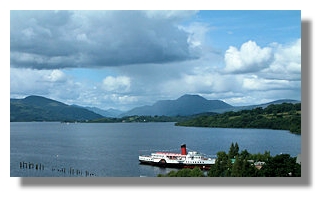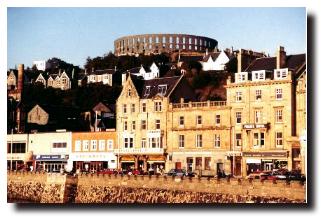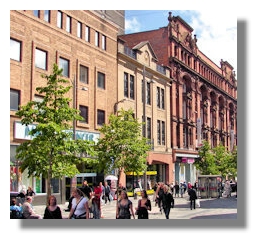Loch

It look so easy and yet so many people pronounce it "lock" which is not correct. The Scottish 'ch' sound has parallels with German (as in achtung!), involving almost a clearing of the throat to say it. Even after demonstrating it to some folk, they find they cannot copy it as their voices have never come across a sound like it before! The little town of Avoch in Ross-shire is a perfect example - ignore the first two letters of its name and just say "Och" and you'll be speaking like a local! If you can manage to pronounce Avoch and Kinloch Rannoch correctly, the advanced course is probably the old chestnut "It's a braw bricht, moonlicht nicht, the nicht." The illustration here is of Loch Lomond.
Mallaig
Mallaig, a commercial fishing port on the west coast of Scotland , is pronounced "Mal-ig". It is the terminus of the West Highland railway line running from Oban - one of the most scenic railway lines in Britain and used in the films of the Harry Potter books.
Milngavie
Another of those names designed to separate the locals from the travellers! Pronounced, would you believe, "Mill-guy" (with the accent on the second syllable) Listen to many locals, though, and it might sound more like "Mull-guy". It is often said that the name derives from "Gavin's Mill" but another possibility is that it comes from the Gaelic "muileann gaoithe" meaning windmill. There is an apochryphal story of an American couple passing through Milngavie who became aware that it had a pronunciation to confuse most tourists. So they thought they'd ask a local. When having lunch they asked the waitress: "Can you tell us how you pronounce the name of this place and say it slowly so that we can pick it up". The obliging lass said, slowly and clearly "B-u-r-g-e-r K-i-n-g".
Oban

The stress is on the 'O' not on 'ban'. The Norse word 'hop' meaning a landlocked bay became 'ob' in Gaelic. Oban was a small village until Victorian times when the railway and steamships and its geographical location combined to turn it into the main town in Argyll and the main port for the Hebrides.
Penicuik
Pronounced 'penny cook' this is another town near Edinburgh. 'Pen' was the old Brittonic word for 'hill' and can be found all over Britain, particularly in Wales. In the case of Penicuik it is from 'pen y gog' or 'cuckoo hill'.
Poolewe
Pronounced "pool-you". Despite being further north than Moscow, the village of Poolewe on the west coast of Scotland, benefits from the effects of the Gulf Stream. It is also in the shelter of Loch Ewe where the shortest river in Scotland, the River Ewe, joins the sea less than a mile from Inverewe Garden, renowned world-wide for its subtropical plants.
Sanquhar
Pronounced "Sankhar" this Dumfriesshire town has been a royal burgh since 1598. The name comes from two Gaelic words meaning "old fort".
Sauchiehall Street

While the correct pronunciations of this famous shopping street in the centre of Glasgow may well be more like "Saughiehall" (with a soft "gh" sound) you will find that from many Glaswegians it will sound more like "Suckiehall" Street. The name is derived from "saugh" the Scots word for a willow tree and "haugh" the word for a meadow (which was later corrupted into "hall"). Originally, it was a winding, narrow lane, with villas standing in gardens of about an acre or so. It was widened in 1846 and is now a mile-long, broad street, running in straight lines, from Buchanan Street in the east to Kelvingrove and the Museum and Art Galleries in the west.
Scone
Lots of folk are prone to pronounce this one "Skawn" - as in scones, butter and jam (though many folk incorrectly pronounce the food version to rhyme with "cone" rather than "lawn"). But it's proper rendition as a place name in Perthshire is "Skoon" to rhyme with "spoon". Scone was at one time the capital of Scotland and many of the Scottish kings were crowned there on the Stone of Destiny - until King Edward I carried it off to London.
Strathaven
Surprisingly, considering all the straths (valleys) in Scotland, this small Lanarkshire town is pronounced "Stray-vin". The name comes from Gaelic "Srath Aibhne" meaning valley of the Avon. Its most famous resident was Sir Harry Lauder (1870-1950) whose mansion, Lauder Ha', or Hall, was just above the town on the road to Kilmarnock.
Tarbolton
Tarbolton in in South Ayrshire was the haunt of some great bachelors (including Robert Burns) who participated in the Bachelor's Club there. It is pronounced Tarbouton or Tarbowton.
Wemyss
Pronounced "weems" there are three places with this name - near Aberfeldy in Perthshire, in Inverclyde and on the coast of Fife. The name is derived from the Gaelic "uaimh" meaning "cave" and it has been incorporated into other Scottish placenames such as Pittenweem (also in Fife).


